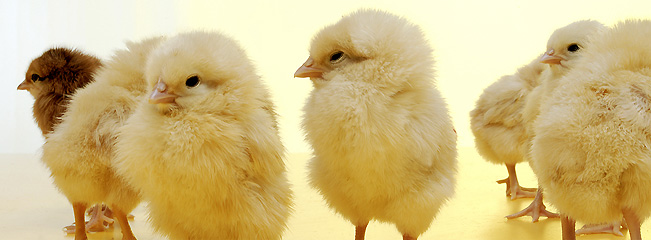Caring For Your Poultry
In our opinion, happy chickens are productive chickens. If ours aren't productive members of the flock then they are a liability versus an asset. You should look at yours in much the same manner unless you simply consider them pets. For most people, they want eggs from their hens and if they aren't producing then the feed and time invested is wasted. Sometimes even properly cared for birds, male or female simply aren't productive for their purpose. these should be culled from your flock and replaced with new stock.

What is a happy, productive chicken? For us it is regular egg layers, hens that like taking their dust baths and go about their business in an active manner. For roosters, he should be tending the hens and looking out for them, calling them when he finds something of interest and so on. One little thing we find is when we are around our hens they will 'talk' to us quite a bit (we haven't yet figured out the intricate language of chicken). If they are feeling bad in some manner, they don't have the same chatter they usually do. They are also less active and usually if you have these symptoms, egg production has probably dropped. It's then time to put on your detective hat and figure out what is going on. Could it be just a seasonal change in the weather or daylight hours? Is it maybe parasites? Did you get a bag of bad feed? Or is something more serious like a disease taking hold of your flock? Always isolate any sickly members as a protective measure for the remainder of your flock. It's a good idea to plan ahead as to where you would put any sick birds and have the appropriate waterer/feeder available. Sometimes a little vitamin supplement or other non-medicinal additive in their water will snap them out of it. Other times you may need to take drastic action to save your flock. Disease can be spread by other birds (sparrows and what ever is in your area), rats and mice, even you can bring unwanted disease to your flock. Practice some kind of biosecurity by not directly adding newly purchased birds to your flock. Keep them apart for a week or 2 for observation. You, simply walking from one coop to another, can spread anything that might be around. Yes, this is not the norm for most people but it is possible.
So what is considered general care? Mostly the same things you did from when your day old chicks showed up at the post office. You provided a clean shelter, feed and water and kept an eye on them. But ongoing year over year care needs to include a few additional things in most cases.
-
1.
Probably if your birds are over 1 year old you should be on an annual worming program of some sort. Be cautious with what you use. Quite a number of wormers are not for laying type poultry. Most have a withdrawal period where you should not consume the eggs as well. Read the label well. Know what you are buying and giving to your flock!
-
2.
You should provide oyster shell free choice to your hens as they can probably use it. Most feeds have calcium but often not enough. Your hens will only eat it if they need it. A small dish is plenty for small flocks and you can simply keep an eye on it and refill as necessary. Depending on your floor within your coop and your run, you may need to provide grit. This is required for the chickens to digest their food. If it's available naturally where they roam then great, otherwise you'll need to provide it, in some form. Grit and oyster shell are available at most Ag or farm stores and is inexpensive.
-
3.
Parasites can be a problem for many. Weather, coop environment and other factors can sometimes bring on a surge in the pesky little critters. They are usually easily defeated but sometimes they are stubborn and just won't go away. We've found that castor oil, yep the stuff grandma used to have on hand for almost everything, works quite well. Leg mites are no match for a good heavy coating on castor oil. Problem combs and wattles, not a problem any more. Does a hen have a patch of skin that is just irritated and doesn't seem to heal? Try a little castor oil on the spot and see if it goes away. Castor oil is thick and suffocates mites and lice as well as other tiny little bugs. It also acts as a conditioner helping sooth skin irritations and more. We find it a very useful item to keep around for treating individual bird when we see a 'spot' that isn't normal or leg scales not looking quite right.
More to come....